INSANE HAIR GROWTH FROM ORAL MINOXIDIL! INCREDIBLE RESULTS!
I wanted to discuss about oral minoxidil for the treatment of androgenetic alopecia. I’ve covered this topic not too long ago but I came across a post on hairlosstalk a couple days ago regarding a guy that goes by the user name GRIM and he shared some incredible results of hair growth on his left temple after taking oral minoxidil.
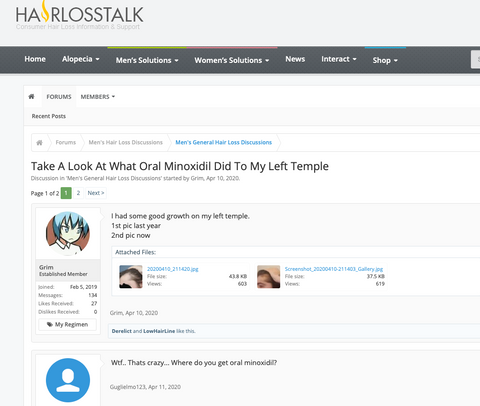
According to his post, he’s been taking 10mg of oral minoxidil tablets for the past few months. Before, he was taking topical minoxidil but didn’t see any results and decided to take oral minoxidil and about 9 months in, he started seeing crazy hair growth on his temples which is just amazing, considering this is all from solely oral minoxidil.
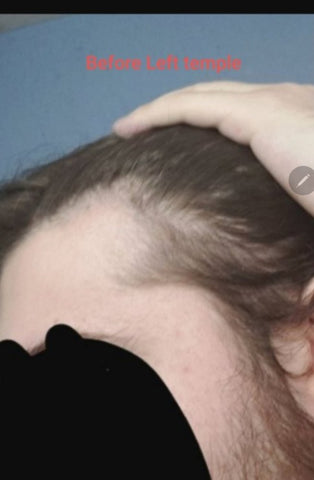
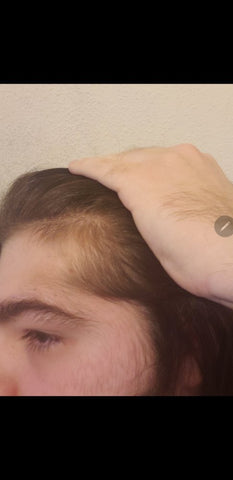
He also adds that taking oral minoxidil has also helped him regrow a lot of hair back due to retrograde alopecia, which is a form of hair loss that affects the lower portion of the neck called the nape as well as the sides of the scalp, right above the ears. And this is something that I am also suffering from, particularly the sides of my head above the ears, and to date, there’s not a lot of information as far as treatments are concerned. I keep the sides relatively short whenever I cut my hair since it disguises the thinning.
There’s not a whole lot of scientific studies on oral minoxidil for the treatment of androgenetic alopecia but there’s a compelling study from August 2019 by Spanish scientists that looked into the effectiveness and safety of low dose oral minoxidil in males suffering from genetic hair loss.
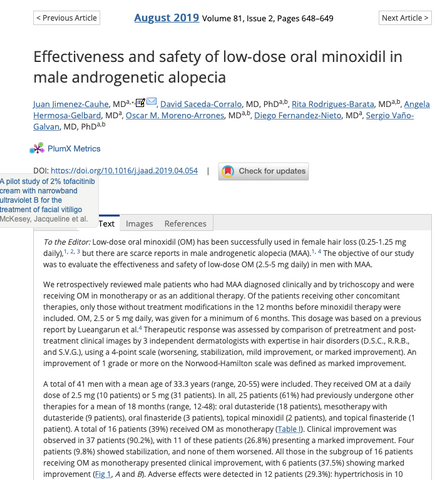
Previously, there were a few studies on low dose oral minoxidil that had been successful in female hair loss. The study states 2.5 or 5mg of oral minoxidil was given daily for a minimum of 6 months in a total of 41 men between the ages of 20 and 55. A lot of men in this group were already taking other means of treatment (dutasteride, oral finasteride, topical minoxidil, topical finasteride) for an average of 18 months and weren’t good responders to treatment. Clinical improvement was observed in over 90% of the patients and none of them had conditions that worsened, which means that oral minoxidil has pretty high efficacy in stabilizing hair loss for the majority of the users. Side effects were minimal with 2 patients suffering from edema and 1 patient who underwent hair shedding.
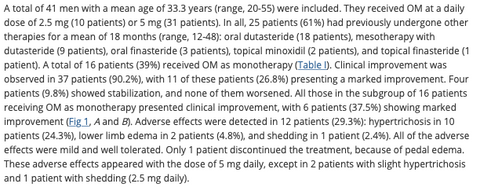
Here’s a photo of a 28 year old who was suffering from androgenic alopecia as a NW2 and has seen marked improvement after 3 months of treatment using 5mg oral minoxidil in mono therapy. You can definitely see improvement to the hair quality itself as well as crown density improvement and even the mid scalp. The hairs look so much healthier than it did previously.
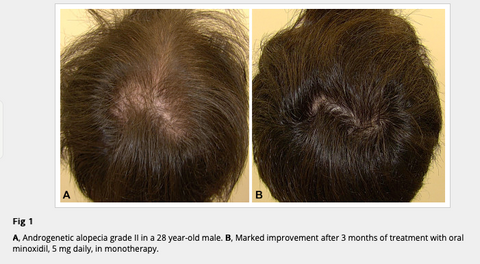
The further concludes with the fact that the study’s retrospective design and low number of patients are limitations that would need to warrant further studies for a more definite and conclusive evaluation, but there’s no doubt that oral minoxidil is indeed effective at treating androgenetic alopecia and is presented as an acceptable safety profile for males. The optimum dose would need to be delineated in future controlled studies.
Oral minoxidil isn’t really prescribed as a treatment for androgenetic alopecia because it was originally intended to treat hypertension, but after observing that one of the reported side effects was hair growth, it was later used as a topical to treat hair loss under the trade name Rogaine. The mechanisms by which minoxidil promotes hair growth is still not fully understood but research confirms that it acts as a potassium channel opener, and theoretically, it helps widen blood vessels and opening potassium channels to allow nutrients and oxygen and blood to the scalp. A lot of people who are using minoxidil undergo shedding as the hair follicles transition to the telegenic phase and then eventually are replaced with thicker and stronger hair in the new anagen phase. Other studies also possibly indicate that minoxidil acts as an anti-androgen with significant down regulation of the 5 alpha reductase gene expression.
I would imagine a lot of doctors would be hesitant to prescribe oral minoxidil for the treatment of hair loss only because we have the topical application and other FDA approved hair loss medication such as oral finasteride that targets one of the root causes of genetic hair loss. Taking oral minoxidil would be an off label medication since it isn’t FDA approved for hair loss, but there are doctors in the US that are willing to prescribe you oral minoxidil if you are not a good responder to mainstream treatment. I don’t personally know of any since I’ve never asked, but if you take a look at various hair loss forums, people do get prescriptions from doctors or they get it online from various sources, which can definitely be dangerous since you don’t know if they’re counterfeit or not. But, it’s the same way with dutasteride. It’s not meant to treat hair loss in the US specifically, but a lot of people are using dutasteride off label for androgenetic alopecia because it shows better efficacy than finasteride due to its inhibition of over 90% of systemic DHT whereas finasteride only inhibits about 70%, and dutasteride has a longer half life compared to finasteride and inhibitions of both types I and 2 of the 5 alpha reductase enzyme. In Korea, dutasteride 0.5mg is FDA approved for treating hair loss and a lot of people opt to take dutasteride over finasteride due to its better efficacy.
But for those who are not responders to mainstream treatment and want to look into taking oral minoxidil, you obviously want to speak to a knowledgeable doctor on the possible side effects. One of the major side effects from taking oral minoxidil is fluid retention, which can lead to congestive heart failure. And this is why most doctors who prescribe oral minoxidil usually prescribe a beta adreneric blocking drug and a diuretic to be taking together to reduce the side effects. One study shows female patients combining oral minoxidil and spironoclatone, which is also a powerful anti androgen, lowers high blood pressure and fluid retention given that it is a diuretic and can help balance the sides from oral minoxidil. Side effects were stated to be generally mild.
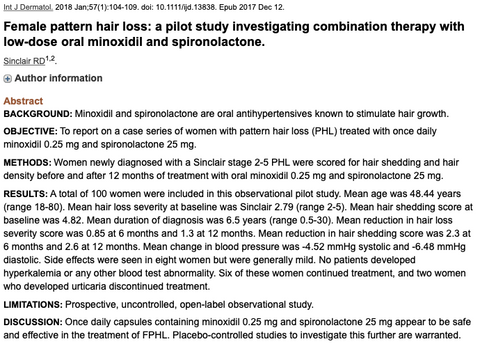
Ill end this video with an article I found from back in August 2019 where 17 children in Spain were accidentally given oral minoxidil after a drug supplier had mixed up a heart burn medication called omeprazole with oral minoxidil, and the children ended up with werewolf syndrome, also known as hypertrichosis which causes thick hairs to grow all over the body.
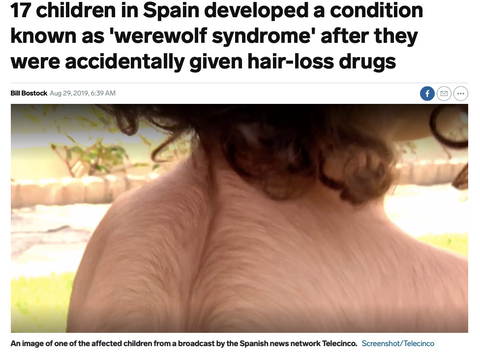
But this, along with others who have posted their incredible results from taking oral minoxidil, show how efficacious this treatment can be. I’m currently only on oral finasteride and topical minoxidil, but I think this may be a good alternative to check out for those who have not been good responders to other treatments. I may look into taking oral minoxidil later down the road if my current regimen isn’t effective or loses efficacy, but as of now, I don’t have a need to jump on oral minoxidil. You obviously would want to consult with at doctor and find someone who is willing to prescribe you oral minoxidil as well as be aware of the possible side effects this can bring. That’s all I have for today, if you liked this video, give it a thumbs up, subscribe, and ill talk to you in my next video! Take care.
